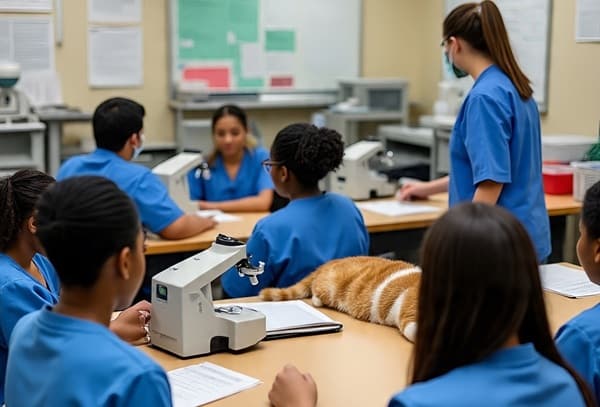What Is a Vet Tech Program All About?
A vet tech program prepares students to work alongside licensed veterinarians in clinical settings. From assisting during surgeries to running lab tests, vet techs handle much of the hands-on care that animals receive in clinics, hospitals, and even zoos. Think of it like a nursing program, but for animals.

The First Day in Class Feels Like a Zoo — Literally
On my first day in the program, I remember walking into a lab with a Golden Retriever wagging its tail at the front of the room. Our instructor didn’t waste time with icebreakers.
Instead, she handed us gloves and said, “Let’s check vitals.”
No textbooks — just paws-on learning.
That’s when I realized this career was going to be anything but ordinary.
Where Classroom Meets Kennel
One thing that sets a vet tech program apart is how quickly you move from theory to practice.
You’ll spend part of your time learning anatomy, pharmacology, and microbiology.
The other half?
You’re on your feet, holding leashes, drawing blood, or assisting with dental cleanings.
If you’re exploring options, here’s a vet tech program that integrates real-world clinical training early on.
Skills You’ll Walk Away With
Animal Handling (Even the Grumpy Ones)
Learning how to approach, hold, and calm animals is a huge part of the job.
In one session, I had to assist with a feisty parrot.
Spoiler: Parrots bite harder than you think.
But those moments teach patience, empathy, and how to stay calm under pressure.
Lab Work That Matters
You’ll get hands-on experience running urinalysis, blood counts, and fecal exams.
These aren’t just academic — they directly influence how animals are treated.
In my second term, I discovered a parasite in a stray cat’s sample.
The diagnosis helped the vet prescribe the right medication and save the kitten.
Communication and Teamwork
You’re not just talking to animals all day.
Vet techs explain treatment plans to pet owners, assist vets, and coordinate with support staff.
If you’re shy now, trust me — that changes fast.
Salary: What’s the Financial Payoff?
According to recent labor data, veterinary technicians earn an average salary of $38,000–$48,000 annually in the U.S. Those who specialize in areas like anesthesia or emergency care can earn even more.
With demand on the rise, job stability is strong — especially in urban areas and specialty practices.
In California, for example, vet techs at animal emergency clinics report earning over $60,000 annually with just 3–5 years of experience.
Career Path: Where Can This Lead?
Small Animal Practices
Most grads start in clinics working with dogs and cats. You’ll handle routine procedures — vaccinations, blood draws, wound care.
Exotic Animal Hospitals
Love reptiles, birds, or zoo life? Some graduates work in aviaries or with exotic animal specialists.
One of my classmates now assists in a raptor rehabilitation center. She spends her mornings feeding hawks and cleaning eagle nests.
Research Labs and Universities
If clinical work isn’t your style, research may be your calling. Many universities and pharma labs hire vet techs to assist with animal care during studies. It’s a quieter setting but equally important.
What Makes a Good Vet Tech?
Emotional Stamina
Let’s be honest — this isn’t always a happy job.
Sometimes animals don’t make it.
Sometimes owners can’t afford treatments.
But you learn to find meaning in the small victories: A puppy recovering from surgery, or a cat that finally eats after a tough illness.
Quick Thinking and Steady Hands
In one emergency drill, we had to simulate CPR on a dog manikin.
Heart racing, we had just 30 seconds to get into action.
That’s not just a test — it’s prep for real-life emergencies.
A Sense of Humor Helps Too
There was a day a goat got loose in the hallway.
Chaos? Yes.
But we learned to laugh, then chase.
Some days feel like a comedy show.
That balance keeps you going.
Licensure and Next Steps After Graduation
After finishing your vet tech program, you’ll need to pass the Veterinary Technician National Exam (VTNE) to become credentialed.
Requirements vary by state, but this is a must-have if you want to work legally in clinical settings.
Some grads also choose to specialize further — in areas like surgical technology, internal medicine, or equine care.
There are continuing education programs and certifications for nearly every niche.
Final Thoughts: Is It Right for You?
If you love animals but also enjoy science, problem-solving, and don’t mind a little mess, a vet tech program might just be your calling.
It’s demanding, yes.
But every scratch, stain, and long shift feels worth it when a tail starts wagging again.
More than just a job, it becomes a lifestyle — one where animals count on you to be their voice, their advocate, and sometimes even their hero.

